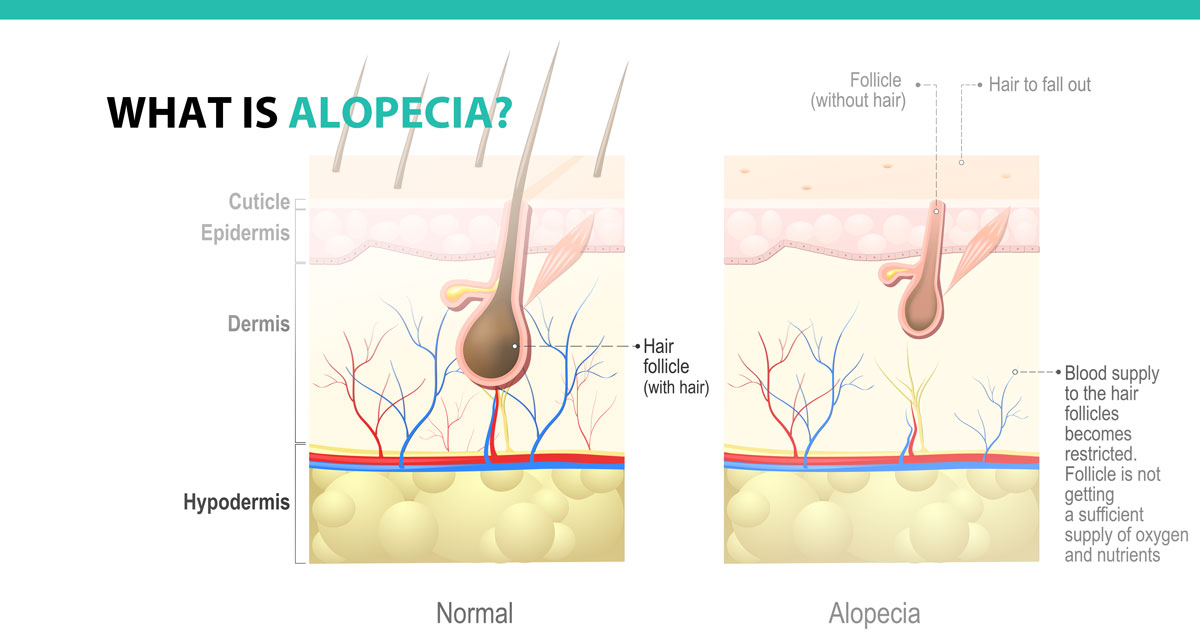
If you’ve started noticing a lot of hair stuck on your hairbrush or in the shower drain, you could have alopecia. This condition results in patches of hair loss on your scalp. Although these spots could be as small as the size of a quarter, in extreme cases, you could lose all of your hair. Alopecia affects over 6.5 million people in the US and is notoriously unpredictable. In some people, the hair might grow back after a loss, while in others, it stops falling permanently.
What Are the Causes of Alopecia?
Alopecia is triggered by an autoimmune deficiency that confuses healthy cells for harmful foreign substances. Your body’s defenses attack hair follicles after mistakenly identifying them as invaders. The affected follicles reduce in size and ultimately stop hair production.
Alopecia also occurs in patients suffering from other autoimmune conditions. These illnesses include lupus, type 1 diabetes, vitiligo, rheumatoid arthritis, and thyroid disease. Even after successful diagnosis and management of these conditions, it’s still possible for alopecia to spread.
Scientists believe some people are genetically predisposed to the condition. It affects mostly adults aged 30 to 60. In rare cases, alopecia occurs in children. Although research is still ongoing, it’s also linked to certain environmental factors.
Signs, Symptoms, And Diagnosis of Alopecia
Alopecia doesn’t cause any pain. In rare cases, the hair loss may extend from your scalp to the eyebrows, beard, and other body parts. You might also notice hairs on your pillow, sofa, and other places where you regularly rest your head. An examination of some hair samples under a microscope is enough to confirm alopecia.
A biopsy results in a more accurate diagnosis since a variety of conditions causes hair loss. A blood test might be necessary to rule out or confirm the presence of other autoimmune diseases. Alopecia’s effects are more psychological than physical. The loss of hair doesn’t adversely affect your body’s overall functionality. Depending on how extensive the situation is, it leads to heightened self-awareness and low self-esteem.
Types of Alopecia
Alopecia Areata is the most common type of this condition. It’s marked by a few hairless and round patches on the scalp or other parts of the body, usually not more significant than a quarter. Other types are:
- Alopecia totalis: It causes hair loss on the entire scalp, resulting in complete baldness.
- Alopecia universalis: This is the rarest form as it causes total hair loss on the entire body.
Is There a Treatment for Alopecia?
Because the exact cause of this condition is unknown, there’s no way to prevent it. Though it doesn’t have a cure, alopecia can be treated in the following ways:
-
Prescription of Corticosteroids
These drugs tackle inflammation caused by autoimmune diseases. They are available in various forms. Other than pills and ointments, some corticosteroids are injected directly on the affected patch or in other parts of the body.
-
Immunotherapy
This treatment plan is suitable if you suffer massive or recurring hair loss. A chemical application triggers an allergic reaction, which causes hair to grow. This type of therapy has to be done several times to maintain growth.
-
Minoxidil
It’s available as a solution and form. Minoxidil mainly treats male baldness and thinning hair in women. We don’t recommend it for patients under 18 years. Minoxidil is most suitable if you have a family history of baldness or hair loss.
Contact a Hair Restoration Expert Today
Are you experiencing patchy hair loss or male pattern baldness? The Advanced Medical Hair Institute provides safe, natural-looking, and practical hair loss solutions. Led by Dr. Williams, a pioneer in the field of hair restoration, we have customized treatment plans for alopecia and other hair-related issues. They range from non-surgical therapies that improve the quality of your hair, to permanent surgical solutions. Please schedule a consultation with us today to enjoy the full range of our services.










